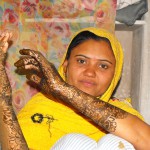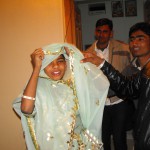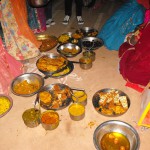Living in a village has its perks; one being that I have been inducted into the society and they have accepted me as a peer and treat me as such. I was invited to a wedding of one of the girls from the craft center that I am currently managing in the village. Chandelao has had it’s fair share of weddings this winter but this is the first that I have been cordially invited to rather than just being prodded or persuaded to join in due to providing entertainment as the dancing white girl.
I would say the best words to describe the experience are colorful, elongated, solemn, and confusing. The wedding, like most Indian weddings, lasted three days last weekend. The first and second nights are for the respective sides of the family to have their own traditions and ceremonies with the bride or groom, and the third night of the wedding is the main and actual ceremony of the wedding. The first night, Radhika, a friend who came for the wedding, and myself escaped having to go because it was just a night of dancing and the next night would be very similar.
The second day of the wedding, we were invited to one of the bride’s family member’s home to have lunch as part of the weekly celebrations. The family members in the village all commit to helping and to take some of the financial burdens of the family, they have some of the meals for the guests and families at the their house rather than the bride’s home. The bride’s family incurs most of the cost for the wedding and has to cover the wedding ceremony, guest accommodation and board, dowry (still popular in villages though outlawed in India), and gifts to the bride that will actually be taken as gifts to her new family. The groom’s side of the family really just has to provide the son to marry and receives all the gifts and money for taking on a new daughter-in-law.
The second night of the wedding, Radhika and myself ate dinner at home and then went to the wedding around 9 p.m. and were happily invited into the room with the bride. We were being treated specially because Radhika and I were special guests for them. They treated us very nicely as well by allowing us in the family affairs while the bride and her family were given mehindi (henna) and dinner. Since we had already eaten, we agreed to have the sweet that is given at most weddings: lapsi. After eating most of our portion, the ladies all started feeding us bites from their hands, which is a customary way of showing affection. With at least three large bites of lapsi in my mouth, one of the younger girls put in a bite of roti with savji (chapatti and vegetable) in my mouth and made me nearly throw up. Not a good mixture, but I was able to swallow it. Shortly after dinner, the dreaded dancing time came. We both knew that we would have to dance, especially me who had been getting teased all week by the other girls at the center about dancing. Well, not long after walking outside, I was forced to dance to the second song and had to do a traditional Rajasthani dance, which ended up looking more like a hula, or so I think.
The night was full of dancing from family members to show well wishes to the bride. There was also an improv play from an aunt and her nephew and they dressed up like opposite sexes and cracked jokes about marriage, or so I was told. We left earlier than most and went back before it was very late. The next day we knew was the late night.
The saddest night I have had in India was the third night of the wedding. When we arrived at the wedding house, we were once again allowed in the room where the women of the bride’s family were getting her ready. Manju, the bride, was nearly dressed and was huddled in a corner looking like a frightened animal getting ready to meet her end. I have been to other weddings but they were all in the city and I think the couples had at least known each other a short while before getting married. In the village, however, the bride and groom most likely have never met and get introduced as they are being married be a priest. It’s no wonder why Manju seemed so scared. Can you imagine getting married to someone you have only heard a bit about and being ripped away the only things you have ever known: your family, your friends, and your village?
After a while in the room, sitting confused and solemn over the impending pairing of two unknown people, the groom was soon to arrive so most people went outside to see him be delivered on his horse. I watched as a bystander as the groom disembarked from his horse, not so gracefully, and while the priest blessed the groom and performed puja for him and the other male guests of the village, all sitting outside of the marriage home. Once the priest had blessed the male caravan and elders of the bride’s village, the groom once again dawned the courage to get on the horse to enter the bride’s home after the women completed certain rituals of blessing. I retreated to inside of the inner walls to watch the groom enter on his horse and be ushered to an area where all the female and young family members could crowd around and one by one give blessings to the groom.
The commotion died down rather quickly once all the blessings had been given and the groom then retreated to outside of the home again; my guess is to be entertained by the male family members of the bride’s side, most likely by drinking. Once again, the waiting started and being an auspicious community, they had to wait until after 11:03 to perform the wedding ceremony. Once the time reached, the bride was ushered out to meet the solemn and unresponsive groom. The priest then placed their right hands together, the first touch of the soon to be married couple. Next came the promises that each of the fearful quarries had to make to one another and proceeded to walk around the fire built as the main part of the ceremony in Indian weddings. Each took turns walking around the fire first, and sometimes together, depending on the promises they made to one another that they most likely repeated from the priest.
I was told about the aftermath of the wedding on the way home, and the next morning the groom, his new bride, and the males from the groom’s family would make the journey back to the new village for the bride. The bride would spend a few days, five in this case, with her new family and then be picked up by a brother or other male family member to come back home for a short time so as to not get completely shut off from everything she has ever known. The groom’s family would play games and slowly get them used to one another by doing things like putting cotton on random places of the body and having each other remove the cotton. These are ways to introduce each other to one another but also to get them used to touching the opposite sex since neither one has ever had sexual contact with the opposite sex, assumingly.
Needless to say, this was a great cultural experience for me even though I was saddened for Manju and the fear that she couldn’t hide. I cannot imagine having to marry someone I had never met before, but on the other side, I imagine they can’t imagine having the choice to marry someone they had to choose either.



